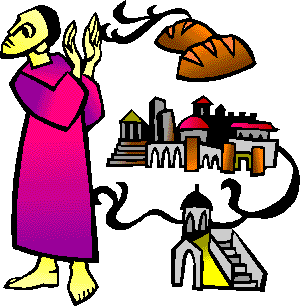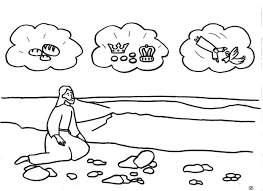 Feb. 28,2016
Feb. 28,2016
EX 3:1-8A, 13-15 PS 103: 1-2, 3-4, 6-7, 8, 11
1 COR 10:1-6, 10-12 LK 13:1-9
God reveals himself in different ways— in ways people can grasp him. Even in dreams, God reveals himself to us. The first reading reminds us of the theophany of God through the burning bush to Moses in the mountain of God (Mount Sinai/Horeb). And Moses hid his face because he was afraid to see God. God heard the affliction of his people and He came down to rescue them from the land of Egypt and lead them out of that land into a good and spacious land, a land flowing of milk and honey. Abraham, however, was commissioned by God to introduce Him to His people but unaware of the name he’s going to say. God said, “I am who I am.”
In the second reading, Paul reminds the Corinthians to be aware that their ancestors were all under the cloud and all passed through the sea, and all of them were baptized into Moses in the cloud and in the sea. But they were struck down in the dessert. Paul reminds them that even those who were called by God can be condemned because of their infidelity. Therefore, Paul challenges them not to desire evil things and let the experiences of their ancestors be a warning for them not to indulge in any form of grumbling or evil.
Last Wednesday (February 24, 2016), we heard and learned about the arson (torching) of evacuation Center provided by United Church of Christ in the Philippines for the Lumad. Whoever is behind this occurrence needs to repent be accountable of the offense made against the vulnerable ones.
Brothers and sisters, we are now on the third week of Lent. During the first week, we heard about the temptations of Jesus in which the devil did not succeed. Last Sunday second week) we heard about the transfiguration of our Lord Jesus Christ. We were then challenged to listen to Him, “this is my chosen Son; listen to him.” In today’s gospel, we are called to CHANGE—to reform while there is time.
Jesus uses three different scenes to repentance. The first two incitements are based on recent occurrences and the third is a parable. The first two events are catastrophic in nature. “The first involves the massacre of a group of protesters, at least some of whom were Galileans. Galilean zealots were notoriously turbulent and Pilate was ruthlessly cruel in dealing with each uprising. The second event, mentioned only in Luke’s gospel, refers to an accident involving the collapse of a tower near to or connected with the Siloam tunnel built by King Hezekiah. Eighteen persons were killed in the collapse.” The question that arises from both incidents is that: “Are the ones who suffer more criminal in their offenses than those who do not suffer?”
The parable of the Fig Tree gives us the image of a loving, merciful and compassionate God. “Sir, let it alone this year also, until I dig around it and put on manure. Then if it should bear fruit next year, well and good; but if not, you can cut it down” (v.8-9). As we can see from the gospel, the vinedresser even bargained with the owner of the land to give the tree a second chance to be fruitful. In our lives, we are like the fig tree on the gospel that even when we do not bear fruit, we are still given the opportunity to be cultivated in order for us to bear fruit. However, if it so happened that we do not still bear good fruit after all the cultivation of the vinedresser, he don’t have the other option but to agree with the owner that is to cut the tree.
God as loving Father always extends his loving arms and ready to embrace humanity any time they repent. It also reminds me of the parable given by Jesus in the Gospel of Luke, “Which one of you, having a hundred sheep and losing one of them, does not leave the ninety-nine in the wilderness and go after the one that is lost until he finds it? 5 When he has found it, he lays it on his shoulders and rejoices. 6 And when he comes home, he calls together his friends and neighbors, saying to them, ‘Rejoice with me, for I have found my sheep that was lost.’ 7 Just so, I tell you, there will be more joy in heaven over one sinner who repents than over ninety-nine righteous persons who need no repentance (15:3-7).
The church has always proclaimed mercy. However, mercy and compassion must be affiliated with repentance.. There must be the desire for forgiveness so that indulgence may be given. The church teaches us to pray, fast and give alms for the expiation of sins. As one of my favorite lines of Mahatma Gandhi, let us “Be the change you want to see in the world” let us give every CHANCE a moment to CHANGE. Be sorry for our sins— reLENT this season of LENT.##
Bro. Ariel Bulan, MJ
Feb. 28 , 2016



 Luke 4:1-2 Jesus, full of the Holy Spirit, left the Jordan and was led by the Spirit into the wilderness, where for forty days he was tempted[a] by the devil. He ate nothing during those days, and at the end of them he was hungry. (NIV)
Luke 4:1-2 Jesus, full of the Holy Spirit, left the Jordan and was led by the Spirit into the wilderness, where for forty days he was tempted[a] by the devil. He ate nothing during those days, and at the end of them he was hungry. (NIV) The Gospel reading for today invites us to reflect on the phenomenon of temptation.
The Gospel reading for today invites us to reflect on the phenomenon of temptation.